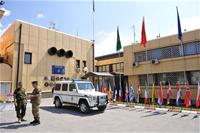A woman assumes for the first time the presidential post in Kosovo
Evelyna Topalova, April 11, 2011
 Kosovo has got its first woman president after the ruling coalition and the main opposition party agreed on the nomination thus avoiding the risk of snap elections. The political crisis was triggered by the March 28th ruling of the Constitutional Court, according to which Behgjet Pacolli's election in Parliament was made in violation of the constitution.
Kosovo has got its first woman president after the ruling coalition and the main opposition party agreed on the nomination thus avoiding the risk of snap elections. The political crisis was triggered by the March 28th ruling of the Constitutional Court, according to which Behgjet Pacolli's election in Parliament was made in violation of the constitution.
The nomination of the millionaire and leader of the junior coalition partner, New Kosovo Alliance (AKR), has been approved only at the third round of voting, lacking quorum and a counter-candidate. Despite the stated willingness to respect the court's ruling, Pacolli failed to resign.
The situation complicated further after his party kept on insisting on the nomination of its leader, which had no chance to succeed in a re-vote in Parliament due the opposition's disapproval. The Government was on the brink of a collapse as the AKR traded its support for the cabinet with the presidential post for Pacolli.
In the negotiations for finding a way out of the political impasse US ambassador Christopher Dell got involved, whose mediation led to a compromise agreement.
The Democratic Party of Kosovo led by Hashim Thaci, Pacolli's AKR and the main opposition party and former coalition partner of Thaci - the Democratic League of Kosovo - agreed on the nomination of Atifete Jahjaga for president. Prior to her election Jahjaga was a Deputy Police Director. According to her biography, quoted by Belgrade-based media, she graduated in law and has received several professional trainings in the security sector.
Jahjaga was elected as Kosovo's president at a parliamentary session held on April 7th. She won the majority of votes in competition with Suzane Novoberdaliu. Media in Belgrade quoted the US ambassador as saying that Jahjaga enjoys the support of US Secretary of State Hillary Clinton and that her election will open a new chapter in Kosovo's history.
In exchange for its support for the presidential candidate, Thaci's ex-coalition partner managed to get a promise new parliamentary elections to be held no later than 18 months after the adoption of changes to the electoral code. This means that the vote should take place in 2013. Pacolli's party in its turn made the concession after the three parties agreed that the constitution will be changed in order to allow the election of a president by a popular vote. According to the agreement six months after the constitutional changes are passed, presidential elections should be held.
This means that Jahjaga will head the presidency only for a while but it will secure the normal functioning of the institutions.
 Bakir Izetbegovic, Andrej Plenkovic | © Council of the EU
Bakir Izetbegovic, Andrej Plenkovic | © Council of the EU Aleksandar Vucic, Recep Tayyip Erdogan | © Serbian Presidency
Aleksandar Vucic, Recep Tayyip Erdogan | © Serbian Presidency Jean-Claude Juncker, Zoran Zaev | © European Commission
Jean-Claude Juncker, Zoran Zaev | © European Commission